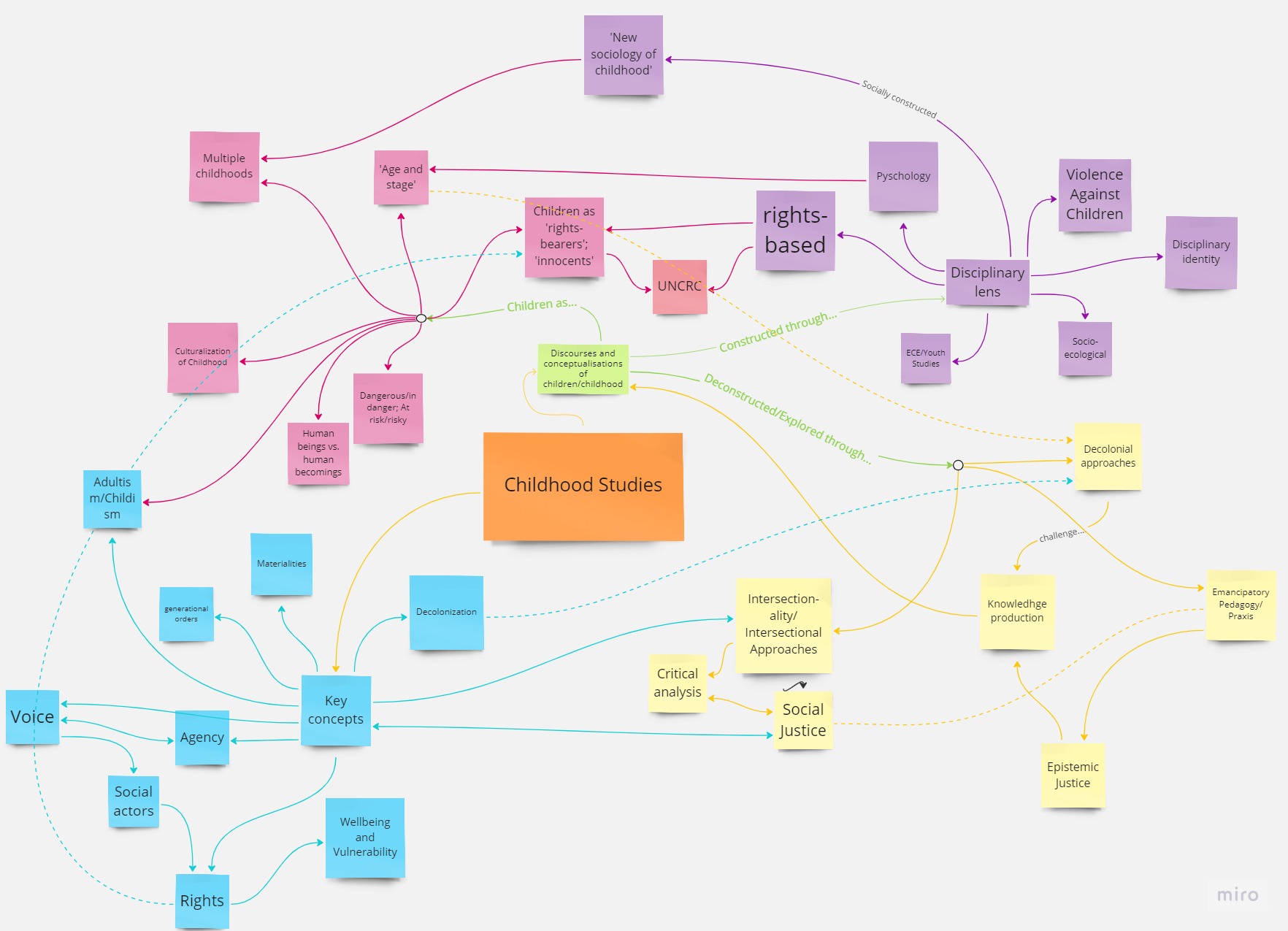


Are you sure you want to reset the form?
Your mail has been sent successfully
Are you sure you want to remove the alert?
Your session is about to expire! You will be signed out in
Do you wish to stay signed in?
Glossary
Click on the link below to test yourself on key terms and definitions from this book’s glossary. Use the dropdown list in the bottom right corner of the Quizlet embed to choose the way you'd like to study.
While taking this quiz, consider:
Connecting Themes
We concluded this book with the following claim:
We ask you to explore how you, as an advanced reader, can use the concepts, theories and debates introduced and explored in this book for emancipatory praxis. The Chapter extracts the key threads stitched across the book to answer the question:
What does childhood studies provide for the student, the researcher, the practitioner in today's context and into the future?
We recognize that even these prompts below might mean different things to you than they do to others. Again, this complexity is ‘not a bug, but a feature;’ in other words, exploring these complexities provides an opportunity for deconstructing the field and moving towards more robust research, theory and practice.
To illustrate the connecting of themes across the chapters of this book, we created a mind map. In making this mind map, we quickly realized connecting ideas and concepts in childhood studies got ‘messy’. We believe this ‘messiness’ represents the complexities of advanced childhood studies as discussed throughout the book.

If an aid to your learning, try drawing your own mind map (or other visualization) of key themes across the chapters.
What’s Missing?
This book presents on a critical childhood studies; however, many topics related to childhood are either briefly introduced or missing from this account. Here we present some examples and indicate additional resources and prompts for discussion:
ü Pedagogy: There are lots of different approaches to pedagogy, which is the theory/meaning behind the way learning spaces are enabled. You will find lots of dated links on the internet that over emphasize constructivist, social constructivist and behaviorist pedagogy. Please consider earlier discussions in the book about deficits-based model approaches if you encounter such information. More contemporary approaches include creative pedagogy, critical pedagogy, social pedagogy, liberational pedagogy and transformative pedagogy that focus on issues of power, hierarchy, social justice and change.
Resources: See for contemporary discussions put in a historical context Terry Wrigley (2020) Pedagogy and Enlightenment, FORUM, 62(1), 7-18. https://doi.org/10.15730/forum.2020.62.1.7.
ü Counseling studies: Similarly, there has been a change in ideas of counselling from professional led approaches to more contemporary approaches that question the power relations involved in different counselling approaches, with counsellors such as Irvine Yalom indicating that the gift of counselling might be that it changes the counsellor and posing the questions about the extent to which those involved in counselling are fellow travelers on life’s journey. Such ideas have filtered into our work with children and connect with ideas from research into children, consent and medical treatment by writers such as Bluebond-Langner and Alderson.
Resources: See also Alderson, Priscilla; Bellsham-Revell, Hannah; Dedieu, Nathalie; King, Liz; Mendizabal, Rosa and Sutcliffe, Katy (2022). Children’s understanding and consent to heart surgery: Multidisciplinary teamwork and moral experiences. Journal of Child Health Care (Early Access). https://oro.open.ac.uk/85373/1/85373.pdf
ü Anthropology of Childhood: The Anthropology of Childhood in the form of Charlotte Hardman and Alison James was at the center of the theoretical shift that established the discipline of childhood studies in the UK.
Resources: An MSc at Brunel University and research at Goldsmiths keep the momentum going in that area of childhood studies.
ü Disability studies: Similarly, work in Scotland around Disability and childhood studies has been ongoing since the 1990s in the Universities of Glasgow and Edinburgh and also in the North of England at Northumbria University, The University of Leeds and The University of Sheffield.
Resources: See for example, varied research: ‘Life as a Disabled Child,’ ‘Disabled children’s childhood studies,’ and ‘The Challenge and Challenging of Childhood Studies? Learning from Disability Studies and Research with Disabled Children.’
Consider:
Looking Ahead in Critical Childhood Studies
In this book, we depict a (selective) timeline of childhood studies, as it relates to the core concepts and debates drawn out in the chapters. However, this timeline is not finite. Consider the following events that may be important elements of a ‘future timeline of childhood studies’:
ü The United States ratifying the UNCRC or exploring alternatives (see discussion in: Abaya et al, 2022 ‘US High-Level Office for Children is Critical for Children’s Rights’; available online: https://www.hhrjournal.org/2022/03/us-high-level-office-for-children-is-critical-for-childrens-rights/)
ü Children being ‘banned’ from forms of digital participation: (see, for example: proposed United State’s Social Media Child Protection Act; https://stewart.house.gov/news/documentsingle.aspx?DocumentID=1166#:~:text=The%20Social%20Media%20Child%20Protection%20Act%20makes%20it%20unlawful%20for,methods%20like%20ID%20verification)
ü Fu
ü Creation of a Caribbean Charter in relation to the UNCRC: (see discussion on children’s rights in the Eastern Caribbean: Murray et al. 2019, ‘Safeguarding the protection rights of children in the Eastern Caribbean’ The Routledge International Handbook of Young Children's Rights. Oxon/New York: Routledge, 192-205.)
Select one of these (possible) future events and conduct research; some resources to begin this search have been provided.